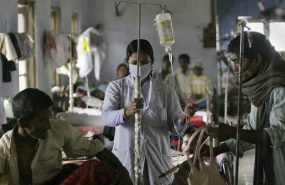Scaling up programs to reduce human rights barriers to services: GF strategy
- 13.07.2016 02:31
- Post Views: 1,339
Action points are:
- Integrate human rights considerations throughout the grant cycle
- Increase investment in programs that address human rights barriers to accessing health services
- Ensure the Global Fund does not support programs that infringe human rights
Already GF successfully works in the following directions:
- Integrate HR in grant cycle
- Increase investment in Removing Legal Barriers
- Ensure no violations
Unfortunately, GF was less successful in other activities. There are 7 key programs to reduce HR related barriers. They’ve been recommend and costed by UNAIDS and included into GF and UNAIDS strategies. There is huge evidence of need for these programs. However, GF concept notes often describe barriers, but rarely include programs to eliminate them. Such programs have been implemented on small-scale and they have not been M&E separately. They have not been sufficiently articulated for TB and malaria.
Current investments of GF for protection of human rights are not enough.
- The most recent UNAIDS fast track update once again urged that, if we want to end AIDS, resources need to be spent in a smarter way.
- By 2020, countries need to devote 8% of resources to programs to reduce human rights-related barriers to accessing services, including advocacy and political mobilization.
- No evidence-based estimates of resource needs for critical enablers in the context of TB & malaria.
- The Global Fund has recognized for a long time that it is not enough to make services available.
- The many human rights barriers that people face in accessing services also need to be addressed – whether it is, e.g., stigma or discrimination, gender-based violence, police violence, bad laws and policies, etc.
GF was able to strengthen concept notes application requirements – all concept notes must include such programs for middle-income countries and recommendation for low-income countries. To increase inclusion of programs to remove human rights barriers, it is necessary to overcome number of challenges, such as need to increase political will and demand, need to get programs into grant proposal through budgets, need to ensure capacity at country level for scale up etc.
GF plans to do a baseline study to make a full mapping of barriers, existing programs, estimate and cost appropriate scale and estimate what impact they could have if scale up the programs in 5 years, increase community capacity to work with governments and other partners.
Related News
Global Fund Strategy Development – Open Consultation Questions
COVID-19 is radically altering global health, politics and economics, and the impact upon programs fighting HIV, TB and malaria will likely be tremendous. The new pandemic could completely derail our vast efforts of the past 20 years. At the same time, it has galvanized public awareness on global health security in a way that builds […] Read moreGlobal Fund Technical Brief Tuberculosis, Gender and Human Rights
The purpose of this technical brief is: to assist Global Fund applicants to consider how to include programs to remove human rights and gender-related barriers to tuberculosis prevention, diagnosis and treatment services within funding requests, and to help all stakeholders ensure that TB programs promote and protect human rights and gender equality. Post Views: 811 Read moreGlobal Fund Technical brief on HIV and key populations Programming at scale with sex workers, men who have sex with men, transgender people, people who inject drugs, and people in prison and other closed settings
The purpose of this technical brief is to provide information for countries preparing funding requests for comprehensive programs that address the cascade of HIV prevention, diagnosis, treatment, and care for the following key populations: male, female, and transgender sex workers, gay men and other men who have sex with men, transgender people (especially transgender women), […] Read moreServices for migrants and refugees from Ukraine – HIV/TB care with a focus on key populations
Due to the increasing flows of refugees from Ukraine because of Russia’s invasion of Ukraine, the EECA Regional Platform created a spreadsheet to fill contacts details of face-to-face and online services for refugees and migrants (with a focus on HIV/TB care and key population groups).
Regional Platform – EECA
This web-resource is a part of new regional communication and coordination project “Regional Civil Society and Community Support, Coordination and Communication Platform - EECA”, implemented by Eurasian Harm Reduction Association (EHRA).
Tags
See also
-
Grant Cycle 7 Reprioritization: How can communities prepare? 02.07.2025 12:03
-
Webinar: Using Global Fund's Data for Advocacy 12.06.2025 12:00
-
GC7 Grant Reprioritization: Updated Timelines 10.06.2025 14:37







